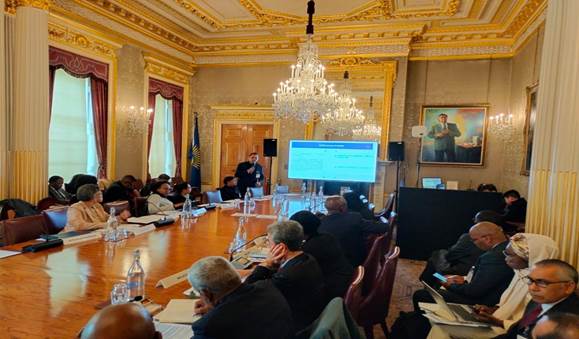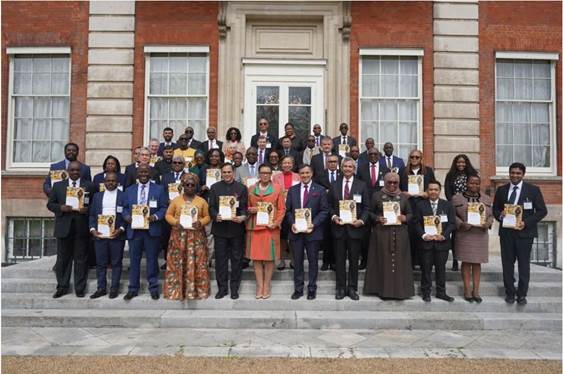Ministry of Personnel, Public Grievances & Pensions
India’s Centralised Public Grievance Redress and Monitoring System (CPGRAMS) recognized as a best practice in Commonwealth Secretaries of public service/ secretaries to cabinet meeting outcome statement
Posted On:
25 APR 2024 1:37PM by PIB Delhi
The Commonwealth Secretariat has recognized Centralised Public Grievance Redress and Monitoring System(CPGRAMS) of India as a best practice in Commonwealth Secretaries of Public Service/ Secretaries to Cabinet meeting that took place from 22 to 24 April, 2024 in Marlborough House, London. In the outcome statement of Third Biennial Pan-Commonwealth Heads of Public Service Meeting issued on 24.04.2024, the commonwealth Secretariat Shared with member countries the Centralised Public Grievance Redress and Monitoring System (CPGRAMS) of India, the Civil Registration and Vital Statistics System (CVRS) and identity management systems of Namibia, Human Resource Management and E-Citizen models of Kenya as future-ready governance best practices from across the Commonwealth.

Shri V. Srinivas, Secretary, DARPG making presentation on the Centralized Public Grievance Redress and Monitoring System
The Indian presentation on the Centralized Public Grievance Redress and Monitoring System (CPGRAMS) was made by Shri V. Srinivas, Secretary, Department of Administrative Reforms and Public Grievances (DARPG), on April 23, 2024 and received commendation from Commonwealth Member countries as a global best practice. The Secretary General of the Commonwealth, Ms. Patricia Scotland KC said "CPGRAMS is a state-of-the-art grievance redressal system and a best practice of SMART government. The Commonwealth’s remaining 1.2 billion citizens can benefit from the adoption of the technology platform in the same way India’s 1.4 billion citizens have benefited."
The theme of the meeting was ‘Institutionalisation of SMART Government to enhance public service delivery’ with focus on adopting AI in governance. The forum brought together Commonwealth Heads of Public Service, Secretaries to Cabinet, Senior Public Officials, industry champions, and eminent scholars.

The Commonwealth Heads of Public Service/ Secretaries to Cabinet Meeting, Marlborough House, London on 22nd -24th April 2024.
The primary objectives of the meeting were to share contemporary knowledge, ideas and experiences on how technology could be leveraged to support provision of e-services for optimal service delivery and achievement of the 2030 Agenda for Sustainable Development across the Commonwealth. It also aimed at sharing select relevant case studies of some member countries and to identify opportunities for possible partnership and collaboration.
The meeting was addressed by Hon Tshering Tobgay, Prime Minister of the Royal Kingdom of Bhutan and The Rt Hon Patricia Scotland KC, Commonwealth Secretary-General.
It was observed that there is currently greater appreciation of the importance of digital government, which has added impetus on the roll out of e-services across many jurisdictions. Indeed, there is notable improvement in the way that public services are being delivered, through reliance on secure, inclusive and sustainable information and communication technologies that are data-driven
and performance-focused initiatives to strongly move ahead towards digital empowerment of citizens and digital transformation of institutions.
Delegates appreciated the papers and country studies presented by the delegates from Rwanda, Kenya, India and Namibia, and noted that the forum remains an important platform for networking and for sharing knowledge, expertise and ideas on public service management.
Member countries affirmed the CHOGM mandate that seeks to eliminate the digital divide and acknowledged the importance of transformative technologies, such as Artificial Intelligence (AI). Member Countries also noted that AI has potential for future-ready governance institutions and agile governments to enhance efficiency to deliver the Sustainable Development Goals (SDGs), and spur growth and development, by in particular, improving access to education, healthcare, clean water, energy, and to combat climate change, poverty, and hunger. They also welcomed the work of the Commonwealth Artificial Intelligence Consortium (CAIC), which is providing critical leadership across policy, capacity building, research and innovation, data and infrastructure domains, for the adoption of AI across the Commonwealth, especially in Small States.
Member countries also identified the AI Consortium as the platform to lead the way in capacity development work on SMART government to be effectively used for efficient redress of public grievances, improving service delivery, strengthening integrity systems and ushering in procurement reforms.
The meeting was briefed about the Commonwealth Hub for the Business of Government whose aim is to support capacity building initiatives for governments to deliver better, faster, and cheaper public services, create knowledge sharing networks on various aspects of implementation, promote good governance and facilitate achievement of the 2030 Agenda for Sustainable Development.
Member countries hailed the impact of technology on strengthening the justice systems and acknowledged the important role that small claim courts are playing in easing access to justice across many Commonwealth jurisdictions. Member countries received a report on the importance of sustainable funding for technical assistance.
Delegates acknowledged the work the Secretariat has undertaken in strengthening integrity systems in the Commonwealth and stressed theimportance of transparency and accountability in public institutions. The meeting received a report on the importance of sustainable funding for technical assistance.
The meeting agreed and endorsed the following actions:
a) Creation of a community of practice for Commonwealth Heads of Public Service to enhance sharing of knowledge and experiences. Delegates welcomed the opportunity for continued dialogue on topics of good governance during the interregnum between biennial meetings.
b) Conducting a stocktaking exercise on the status of smart governance within the Commonwealth countries and to identify both the success stories as well as the gaps/demand for digital services.
c) Charting of a road map to facilitate implementation of agreed actions at country level. This includes, the establishment of a Smart Governance Working Group at the Commonwealth Secretariat, which would include representatives from champion countries, to spearhead work in the area of smart governance until the next biennial meeting scheduled for 2026.
d) Sharing the work being conducted by the Commonwealth AI Consortium amongst members and expanding the number of members currently being reached through its activities.
e) Sharing future-ready governance best practices from across the Commonwealth such as the Centralised Public Grievance Redress and Monitoring System (CPGRAMS) of India, the Civil Registration and Vital Statistics System (CVRS) and identity management systems of Namibia, Human Resource Management and E-Citizen models of Kenya, shared at the meeting, amongst others, with member countries.
f) Continuing provision of technical assistance to support implementation of GAPP principles, including capacity building in government performance management.
Delegates expressed sincere gratitude to the Commonwealth Secretary-General, Ms. Patricia Scotland KC for her invaluable leadership and thanked the Commonwealth Secretariat staff for organising a fruitful and successful meeting.
The meeting closed with a Vote of Thanks to Hon Tshering Tobgay, Prime Minister of Bhutan for the delivery of the keynote address, all the speakers, resource persons and delegates for their active participation and valuable contributions to the meeting’s discussions and outcomes.
****
PK/PSM
(Release ID: 2018818)
Visitor Counter : 3472